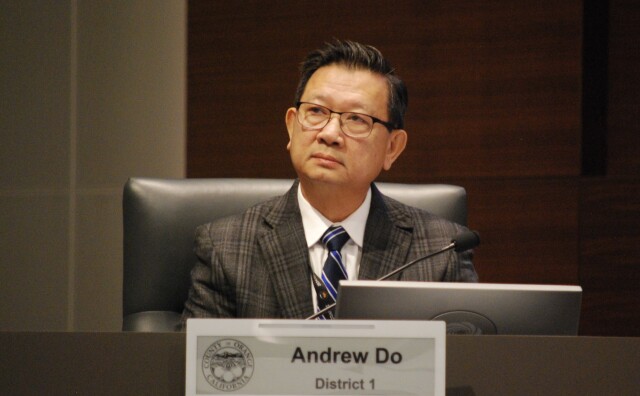Currently, two-thirds voter approval is required to pass local bond measures that fund affordable housing and infrastructure projects in California. Prop. 5 would lower that threshold to 55%.
Official title on the ballot: Proposition 5 — Allows Local Bonds for Affordable Housing and Public Infrastructure with 55% Voter Approval. Legislative Constitutional Amendment.
You are being asked: Should California change the rules in the California Constitution for approving certain local government general obligation bonds, and also require local governments to monitor the use of revenues in specific ways?
-
According to the California Legislative Analyst’s Office:
A "yes" vote means: Certain local bonds and related property taxes could be approved with a 55% vote of the local electorate, rather than the current two-thirds approval requirement. These bonds would have to fund affordable housing, supportive housing or public infrastructure.
-
A "no" vote means: Certain local bonds and related property taxes would continue to need approval by a two-thirds vote of the local electorate.
Understanding Prop. 5
California has a lot of things: beaches, mountains, Silicon Valley, Hollywood. One thing it lacks? Affordable housing.
According to the California Legislative Analyst’s Office, the typical renter pays a 50% premium to live here compared with what renters pay in the rest of the country. Homebuyers can expect to spend double what they would in other states.
Make It Make Sense: Election 2024 Edition
Addressing the shortage of reasonably priced housing has been near top of mind for L.A. voters. Prop. 5 is yet another measure aiming to address that problem. But will homeowners support the measure if it could mean higher property tax bills?
-
City of Los Angeles
- City Council: Vote for districts 2, 10 and 14.
- Charter Amendment ER: A package of ethics reforms designed to fight corruption at City Hall. Plus: Charter Amendments DD, FF, HH and II.
L.A. County
- Board of Supervisors: Measure G would dramatically overhaul county government.
- District Attorney: Criminal justice reform, or more law-and-order justice?
- LA Unified school board: Voters are also deciding on a $9 billion facilities bond and a redistricting measure.
- School district measures: Schools have a lot of repair needs.
- Superior Court judges: Plus: Tips to make sure you're putting right person on the bench.
Statewide races
- Whoa! There are 10 propositions on the ballot. Here's your cheat sheet to Props. 2, 3, 4, 5, 6, 32, 33, 34, 35 and 36.
Jump to the full Voter Game Plan for dozens more races ▶
The history behind it
Prop. 5 is on the ballot because the state legislature voted to put it there.
Lawmakers say the goal is to make it easier for local governments to ask voters for permission to raise money for plans to construct affordable housing and offer assistance to first-time homebuyers — as well as for projects that build infrastructure, such as hospitals, roads and broadband internet networks.
How it would work
If the voter approval threshold is reduced from two-thirds to 55%, the obvious outcome is that local housing and infrastructure initiatives would have a better chance of passing. That may incentivize local governments to put more of those proposals on the ballot.
If these measures pass, projects would be funded through bonds issued by local governments. That essentially means borrowing money that will need to be paid back, with interest, by future property tax revenue.
Cram session
During AirTalk's Ballot Cram Session live event, Larry Mantle talked with Caltech's Michael Alvarez, Pomona College's Sara Sadhwani and Claremont McKenna College's Zachary Courser about Proposition 5.
What people who support it say
Nurses, firefighters and housing advocates say more local action is needed to address a housing crisis that is pushing middle-class families out of California. They say Prop. 5 would make such action possible, and would come with increased accountability measures, such as citizens oversight committees and annual audits.
What people who oppose it say
Taxpayer and homeowner groups say Prop. 5 would make it easier to pile new costs on taxpayers across the state. They say the current two-thirds threshold was enshrined in the 1879 California Constitution, and lowering it now would mean higher property taxes for homeowners in exchange for affordable housing projects that — in some parts of the state — cost more than $1 million per unit to build.
Potential financial impact
The exact financial impact of Prop. 5 is unclear because increased costs would only come when and if voters approve other, separate, bond measures. The Legislative Analyst’s Office says if the 55% threshold had been in effect during recent elections, between 20% and 50% more local bond measures likely would have passed.
State analysts say that change could lead to a couple billion more dollars over many years for housing and infrastructure projects, to be recouped through higher property taxes. But, they conclude, revenue would vary across regions, and voters would have the final say on what local government bonds pass.
Follow the money
Further reading
At this point, you might be wondering, “If local government leaders think funding these projects is such a good idea, why don’t they just raise property taxes themselves?”
One reason they don’t is because of Prop. 13, a landmark measure approved by California voters in 1978 to limit property taxes across the state. You can read more about that pivotal proposition — and how it continues to shape California neighborhoods — by checking out this reporting collaboration LAist had a hand in creating:
- “The Block That Prop. 13 Built” (California Dream Project)
In the November 2000 election, California voters passed Prop. 39, a similar initiative to lower the threshold for approving education bonds from two-thirds to 55%. You can read more about that here:
- “California's Schools & Proposition 39” (California Budget and Policy Center)
Listen in: Prop. 5 debated on AirTalk
Before you read more, we wanted to take a moment to tell you about our mission here at LAist, and why we're so dedicated to helping you get ready to vote.
In the lead-up to this important election, our hard-working reporters and editors spent hundreds and hundreds of hours researching and writing these detailed guides and fact-based resources. We invested that time because we're here to help you vote confidently and make your community a better place.
But we cannot do this essential work without your help. We rely on donations from readers like you to stay independent, which keeps our nonprofit newsroom strong and accountable to you.
At a time when the need for local journalism has never been greater, many newsrooms are facing cutbacks, including LAist. Member support — your support — is what will sustain a free press in Southern California.
LAist’s mission is to be here for you, so please be here for us now with a donation to power our trusted local reporting. Step up right now and make the choice to give. Because that’s exactly what it is — a choice. It's choice with consequences. If readers do not choose to step up and donate, the future of fact-based news in Southern California will not be as strong.
No matter what happens in the world, LAist will remain a voice you know and trust.
Thank you for your generous support.
Sincerely,
-
(she/her)

This voter guide originally published Aug. 27.








